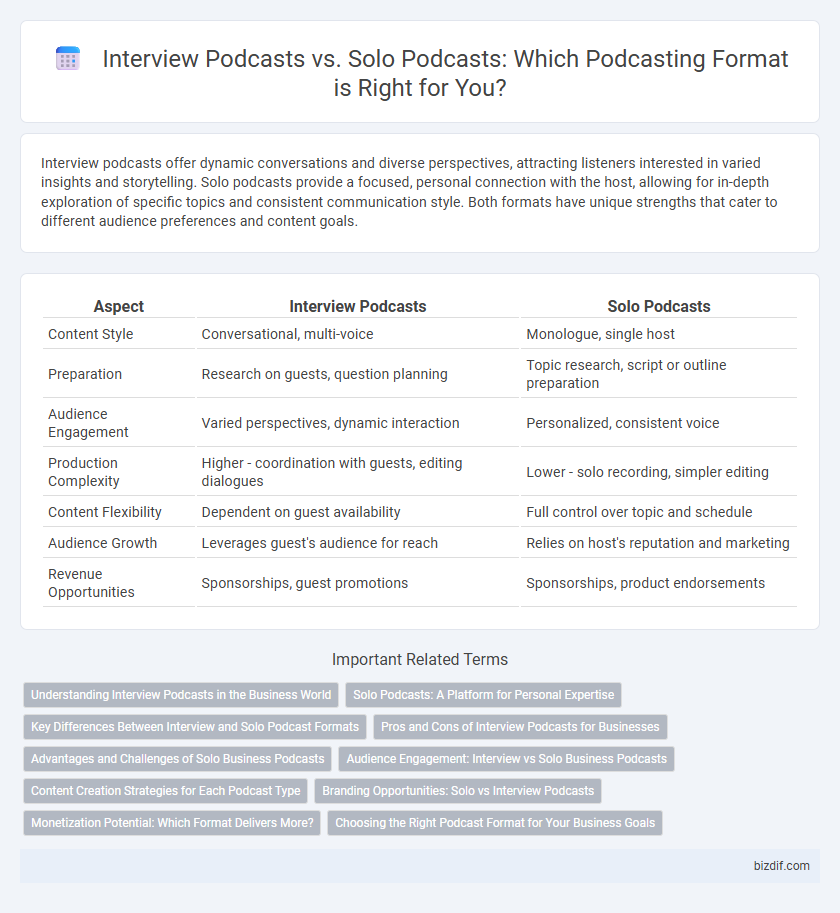Interview podcasts offer dynamic conversations and diverse perspectives, attracting listeners interested in varied insights and storytelling. Solo podcasts provide a focused, personal connection with the host, allowing for in-depth exploration of specific topics and consistent communication style. Both formats have unique strengths that cater to different audience preferences and content goals.
Table of Comparison
| Aspect | Interview Podcasts | Solo Podcasts |
|---|---|---|
| Content Style | Conversational, multi-voice | Monologue, single host |
| Preparation | Research on guests, question planning | Topic research, script or outline preparation |
| Audience Engagement | Varied perspectives, dynamic interaction | Personalized, consistent voice |
| Production Complexity | Higher - coordination with guests, editing dialogues | Lower - solo recording, simpler editing |
| Content Flexibility | Dependent on guest availability | Full control over topic and schedule |
| Audience Growth | Leverages guest's audience for reach | Relies on host's reputation and marketing |
| Revenue Opportunities | Sponsorships, guest promotions | Sponsorships, product endorsements |
Understanding Interview Podcasts in the Business World
Interview podcasts in the business world foster dynamic conversations with industry leaders, providing valuable insights and real-world experiences that enhance listener engagement and credibility. These podcasts leverage expert interviews to build authority and network connections, making them powerful tools for brand positioning and knowledge sharing. The interactive format supports trust-building and audience growth by showcasing diverse perspectives and actionable business strategies.
Solo Podcasts: A Platform for Personal Expertise
Solo podcasts offer a unique platform for individuals to showcase their personal expertise, delivering focused content without external interruptions. These podcasts enable hosts to build a direct connection with their audience, fostering trust and authority in niche topics. By controlling the narrative entirely, solo podcasters can tailor episodes to highlight their skills, insights, and experiences effectively.
Key Differences Between Interview and Solo Podcast Formats
Interview podcasts emphasize dynamic conversations with guest experts, providing diverse perspectives and specialized insights that engage listeners through varied storytelling. Solo podcasts center on a single host delivering focused content, offering consistency, personal connection, and authoritative expertise on specific topics. The key difference lies in audience engagement style: interviews create interactive dialogue, while solo episodes deliver uninterrupted, in-depth commentary.
Pros and Cons of Interview Podcasts for Businesses
Interview podcasts offer businesses dynamic content by featuring diverse expert perspectives that can enhance credibility and audience engagement. They require coordination with guests, which may increase production time and scheduling complexity but provide valuable networking opportunities and fresh insights. However, reliance on guest availability can cause inconsistent release schedules, potentially affecting listener retention and brand reliability.
Advantages and Challenges of Solo Business Podcasts
Solo business podcasts offer complete creative control and allow hosts to establish a direct connection with their audience, fostering a consistent personal brand voice. They eliminate scheduling conflicts and dependency on guests, enabling more flexible and frequent publishing schedules. However, solo podcasts require strong content creation skills and sustained engagement strategies to maintain listener interest without the dynamic interaction provided by interviews.
Audience Engagement: Interview vs Solo Business Podcasts
Interview podcasts boost audience engagement by offering diverse perspectives and dynamic conversations that keep listeners intrigued. Solo business podcasts foster a personal connection, allowing hosts to share in-depth insights and build trust through consistent, focused content. Businesses often see higher engagement in interview formats due to varied voices, but solo podcasts create loyal audiences through authoritative and relatable storytelling.
Content Creation Strategies for Each Podcast Type
Interview podcasts excel in leveraging guest expertise to diversify content, attract niche audiences, and foster industry connections through dynamic dialogues. Solo podcasts rely on refined personal storytelling, consistent thematic focus, and deep audience engagement via authentic voice and expert insights. Strategic content planning for interviews centers on research and question design, while solo formats benefit from structured scripting and topic specialization.
Branding Opportunities: Solo vs Interview Podcasts
Interview podcasts offer diverse branding opportunities by featuring guest experts, expanding audience reach, and associating your brand with influential voices in the industry. Solo podcasts provide consistent brand reinforcement through a single host's unique style and voice, creating a strong, recognizable personal brand. Both formats can leverage strategic content and engagement to enhance brand visibility and loyalty effectively.
Monetization Potential: Which Format Delivers More?
Interview podcasts often yield higher monetization potential due to diverse audience engagement and guest-driven promotion, attracting sponsors seeking broader reach. Solo podcasts may rely more on niche audience loyalty and premium content models like memberships or merchandise sales. Analyzing listener demographics and advertiser demand shows interview formats typically generate greater ad revenue and sponsorship opportunities.
Choosing the Right Podcast Format for Your Business Goals
Interview podcasts foster dynamic content through guest expertise, enhancing audience engagement and expanding network reach. Solo podcasts allow for complete control over messaging and brand voice, ideal for establishing thought leadership and delivering consistent value. Aligning your podcast format with business goals requires evaluating whether relationship building or authoritative storytelling drives your target audience's motivation.
Interview Podcasts vs Solo Podcasts Infographic

 bizdif.com
bizdif.com